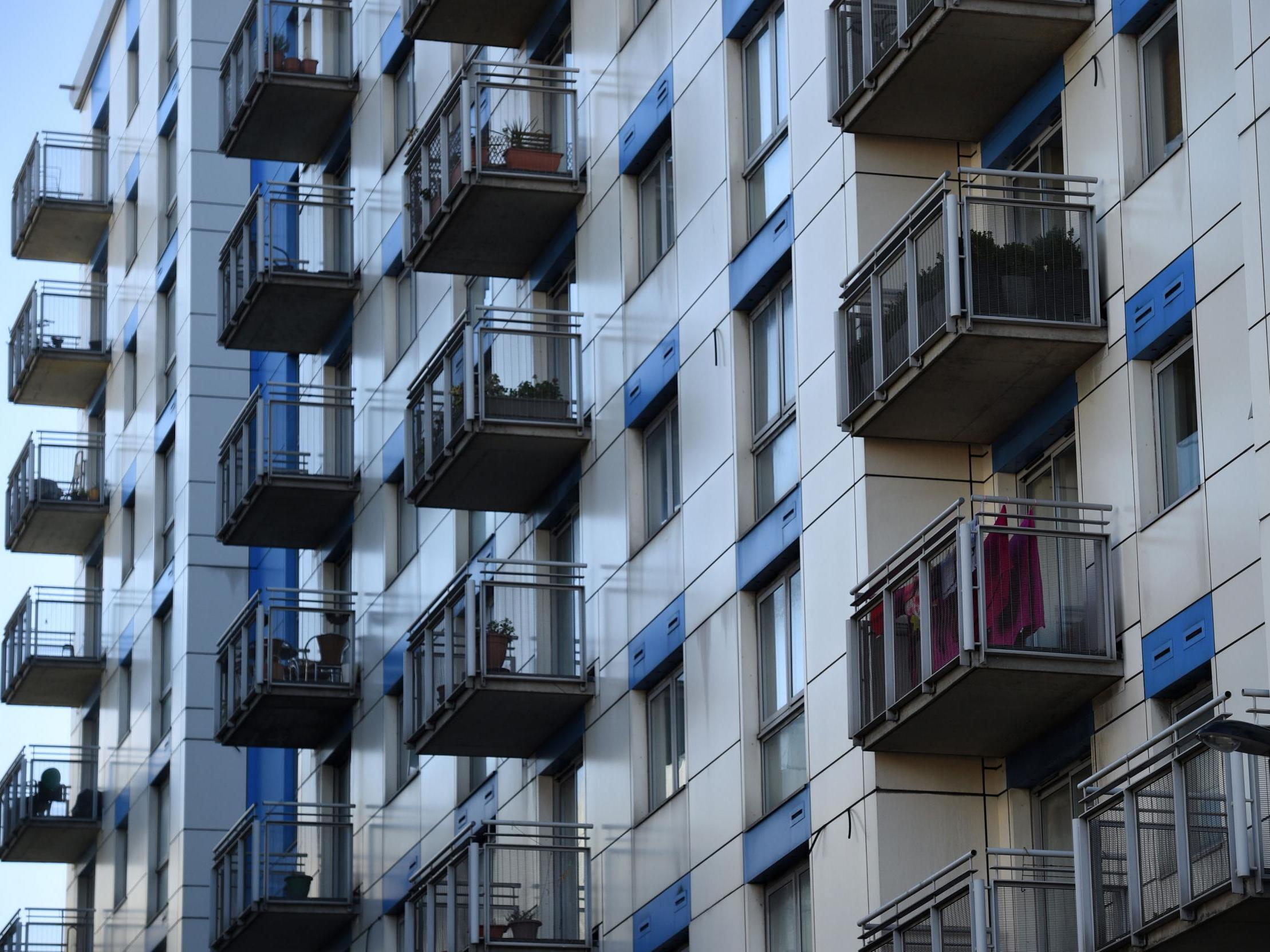‘We’re prisoners in our own homes’: Residents trapped in combustible cladding-wrapped tower blocks say lockdown has exacerbated their fears
Three years on from Grenfell an estimated 500,000 people are still living in flats with unsafe cladding, Emma Snaith writes


Several months after seeing the smoke rise from the Grenfell Tower fire from her window, Mariam Ali-Puttergill discovered that her own home was wrapped in the same flammable cladding.
Now three years on from Grenfell, the 37-year-old teacher’s block is still covered in the dangerous material as she spends all day inside during lockdown with her four-month old baby.
“It’s terrifying,” she says. “I can see the cladding from every window in the building, and being stuck inside means it’s impossible not to think about it all the time.”
Mariam is not alone. More than 500,000 leaseholders are estimated to be living in towers wrapped in combustible cladding in the UK.
These leaseholders find it impossible to sell their homes, with potential buyers unable to secure mortgages, and so they are left to pay soaring amounts in repayments, and for insurance and interim fire safety measures.
They also face bills of tens of thousands of pounds to remove the cladding, and the uncertainty of knowing whether or not this will be covered by government funds.
Lockdown has only added to this feeling of being trapped, residents say, as people fear spending nearly all day in doors will increase the likelihood of a domestic accident sparking a fire amid further delays to remediation work.
“I had anxiety about living here before I was pregnant and now it’s magnified further,” Mariam says. “If there was a fire I would have to run down seven flights of stairs with my baby in my arms.”
“It would have been nice if those first few months with my daughter were not consumed with all this worry and frustration.”
Mariam’s block in Paddington, west London, is covered in aluminium composite material (ACM) – the same type of cladding that helped the fire spread at Grenfell.
Years after the unsafe cladding and other fire safety defects were discovered in the building, remedial work was due to start in May. However, Mariam says work at Paddington Walk has now been further delayed due to lockdown and while the managing agent waits to see if it can access another set of government funding.
Rendall & Rittner, the buildings managing agent, shared the latest letter that had been sent to residents of Paddington Walk with The Independent. It stated that the agent’s application for government funding to cover the cost of removing ACM cladding from the building had been accepted.
However, it added that the agent is “awaiting clarification of how the two funds [the ACM Cladding Fund and the Building Safety Fund] are intended to operate so that all of the works at Paddington Walk can be completed as soon as possible.”
Mariam says resident are “still caught in limbo”. “Home is the place you’re meant to feel safe, where you can let your guard down,” she says. “But it’s been the complete opposite.”
Ritu Saha, who also discovered her flat was covered in flammable cladding just months after Grenfell, says that the financial strain of lockdown has further exacerbated the stress of living in these unsafe buildings.
You feel like you’ve lost control over your life
The 44-year-old university administrator and co-founder of the UK Cladding Action Group says 24-hour fire safety patrols and other measures are costing her and other leaseholders in her block up to £400 each per month.
“It’s a great strain at anytime,” she says. ”But during lockdown we’re struggling more than ever to afford these costs.”
‘We are pretty much trapped – physically, financially and mentally. You feel like you’ve lost control over your life.”
Saha discovered that her block of flats in Bromley, south London, was wrapped with ACM cladding, as well as HPL (high pressure laminate) cladding. The resident management company of Northpoint has been awarded a limited amount of funding to remove the ACM cladding, but there is no guarantee it will be awarded funding to address the other fire safety defects which could cost up to £75,000 for each flat.
“It’s like writing a blank cheque,” she says. “We do not know when the interim payments will stop and when the cladding will be removed.”
Like Saha, Abi Tubis is also feeling the financial strain of having to pay hundreds of pounds (a month) for fire wardens after being furloughed during lockdown.
“Now I’ve lost some of my salary, my anxiety over having to pay £100 for the waking watch each month has increased even further,” she says.
“It feels like we’re prisoners in our own home, we’re trapped all day in a combustible building.”
After discovering that her home was wrapped in dangerous HPL cladding, the 29-year-old account manager founded Leeds Cladding Scandal to join forces with other people facing fire safety issues.
St George’s building, where Tubis lives, is one of of 13 blocks in Leeds the fire service deems unsafe. Residents in her block alone face a bill of approximately £2m to remove the cladding, with no guarantee they will be granted government funds.
The Church of England Diocese of Leeds, the freeholder of the building, said responsibility for the building was with the head leaseholder.
“It’s just overwhelming that legally, all the responsibility is being passed down to the little people, and the government is not doing nearly enough to help us,” Tubis says.
“My husband and I wanted to move out and start a family, but we can’t even think about that anymore,” she adds. “My flat is currently worth zero.”
We’re trapped all day in a combustible building
The uncertainty of not knowing whether they will receive government funding to pay for cladding removal is a predicament faced by many leaseholders.
Chancellor Rishi Sunak announced a new £1bn fund to support the removal of all “all unsafe combustible cladding” from highrise buildings during his Budget in March. It came after the government announced a £200m fund to pay for the removal of dangerous ACM cladding from private residential blocks in 2019.
But three years on from Grenfell, there are still 262 private and social residential blocks wrapped in similar ACM cladding systems. It is estimated that a further 1,700 buildings have some other form of dangerous cladding that needs replacing.
The government predicts that its £1bn building safety fund will cover only a third of the buildings in the country that need work, while those that have already committed funds will be barred
A spokesperson for the Ministry of Housing, Communities and Local Government said: “We are bringing forward the biggest changes to building safety in a generation and have been clear building owners, who are responsible for building safety, must take action as soon as possible to address concerns – backed by £1.6bn in government funding to remove unsafe cladding.
“We do not expect government funding to be the only means of remediating unsafe cladding and where leaseholders have already committed to paying, there may be recourse through building owners through warranty or insurance claims.”
While leaseholders are trapped in this state of limbo over whether they will receive government grants, many face increasing costs for interim fire-safety measures.
Campaigners say this continued uncertainty is taking its toll on the mental health of a majority of affected leaseholders.
A survey carried out by the UK Cladding Action Group of 550 leaseholders found that 14.5 per cent have even had suicidal thoughts, and 8 per cent have felt compelled to self-harm.
“The government refuses to fix the crisis in one go and are only making piecemeal reforms. It’s simply not enough,” Mariam says. “There is a complete lack of justice and accountability.”
“Over time you start to think, what is my life worth to any of these people – it feels like you’re shouting into the abyss.”
Join our commenting forum
Join thought-provoking conversations, follow other Independent readers and see their replies
Comments
Bookmark popover
Removed from bookmarks